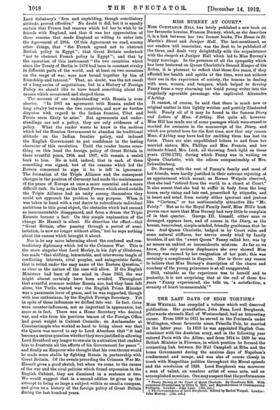MISS BURNEY AT COURT.*
Miss CONSTANCE HILL has lately published a new book on her favourite heroine, Frances Barney, which, as she describes it, is a link between her two former books, The House in St. Martin's Street and Juniper Hall. The last-mentioned, as our readers will remember, was the first to be published of the three, and dealt very delightfully with the acquaintance with the emigres at Juniper Hall which led to Miss Burney's happy marriage. In the presence of all the sympathy which has been bestowed on Queen Charlotte's Second Keeper of the Robes, it is pleasant to reflect that those five years, if they affected her health and spirits at the time, were not without their use in the experience of society, the lessons in dealing with men, women, and tempers, which helped to develop Fanny from a very charming but timid young writer into the singularly agreeable personage who captivated Alexandre d'Arblay.
It cannot, of course, be said that there is much new or original matter in this lightly written and prettily illustrated book. Nearly all of it may be found in the famous Diary and Letters of Mme. d'Arblay. Not quite all, however. Miss Hill has made use of some passages which were erased or marked for omission in the manuscript of the Diary, and which are printed here for the first time, now that any reason Mine. d'Arblay may have had for omitting them has lost its force. There are also unpublished letters to and from her married sisters, Mrs. Phillips and Mrs. Francis, and her intimate friend, Mrs. Lock, all throwing fresh light on those years (1786-1791) during which Fanny was in waiting on Queen Charlotte, with the odious companionship of Mrs. Schwellenberg.
Dr. Burney, with the rest of Fanny's family and moat of her friends, were hardly justified in their extreme rejoicing at an appointment which meant, as Horace Walpole observed, that she had "retired from the world to a closet at Court." It also meant that she had to suffer in body from the long hours, early rising and late rest, prescribed by etiquette, and in heart and mind from society either ignorant and jealous like " Cerbera," or too sentimentally attractive like "Mr. Fairly." But as to the Royal Family itself, Miss Hill's book proves once more that Miss Burney had very little to complain of in that quarter. George III. himself, either sane or deranged, appears here, and of course in the Diary, as the honest, benevolent, simple-minded, friendly gentleman that he was. And Queen Charlotte, hedged in by Court rules and some natural stiffness, her nerves sorely tried by family troubles, if not the "sweet Queen" Fanny called her, was by no means an unkind or inconsiderate mistress. As far as we know, the only serious displeasure she ever showed Miss Burney was caused by her resignation of her post; this was certainly a compliment in disguise. Nor is there any reason to believe that Miss Burney's description of the charm and courtesy of the young princesses is at all exaggerated.
Still, valuable as the experience was to herself and to posterity, it is not surprising that at the end of those five years "Fanny experienced, she tells us, 'a satisfaction, a serenity of heart immeasurable? "


















































 Previous page
Previous page